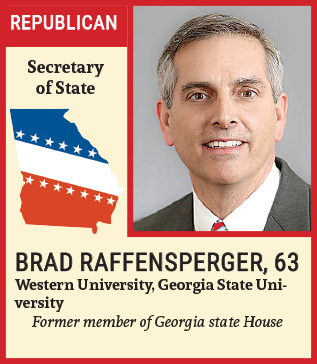Secretary of State Candidates
Republican Brad Raffensperger and Democrat John Barrow are running for Georgia secretary of state.
Candidate for Secretary of State:
 Brad Raffensperger-R
Brad Raffensperger-R
Brad Raffensperger is clear about his priorities if elected secretary of state.
First on his list, according to the Republican nominee, “To ensure that only properly registered U.S. citizens vote in Georgia elections.”
Second, “Georgia has been a great state for job growth and to start a small business, so I want to do all I can to continue that trend.”
Raffensperger hopes to succeed fellow Republican Brian Kemp as secretary of state. He is opposed by former Democratic congressman John Barrow and Libertarian Smythe DuVal.
An Atlanta Journal-Constitution/WSB-TV survey of 1,232 likely voters, conducted Sept. 30 to Oct. 9, showed Raffensperger with 41.4 percent to 36.8 percent for Barrow, with 6.3 percent for DuVal and about 15 percent undecided.
The 63-year-old Raffensperger served three years on the Johns Creek City Council before winning two terms in the Georgia House, representing the 50th District in Johns Creek. He received a bachelor’s degree in civil engineering from Western University and a Master of Business Administration from Georgia State University.
He is the CEO and owner of Tendon Systems, LLC, a contracting and engineering design firm with nearly 200 employees. He also owns and operates specialty steel manufacturing plants in Columbus, Ga., and in Forsyth County.
Raffensperger cites this experience as making him the better candidate to oversee the myriad activities of the secretary of state’s office. “I’m the only business owner in this race that has run an office the size of the secretary of state’s office,” he said during a debate sponsored by the Atlanta Press Club.
Raffensperger told the AJT that, if elected, he will update the voting and registration process to ensure their integrity. Voter rolls need to be updated annually, as 10 to 15 percent of Georgians move every year and that combined district lines being redrawn can cause confusion for polling officials and voters, he said.
“By keeping the voter rolls updated, we can help safeguard and keep our elections clean so we know that the person who won actually did win,” Raffensperger said during the debate.
Raffensperger previously has said that he favored touchscreen machines that provided a printout of voters’ selections.
On the regulatory side of the job, Raffensperger said he would review the process by which the secretary of state’s office regulates and licenses various occupations and professions, and work with the state House to clean up a patchwork of regulations.
He told the AJT that he would consider some level of self-regulation for industries under the secretary of state’s purview, as well as using fees that are collected to benefit the industries being regulated.
Raffensperger said that military veterans could benefit from the state waving corporate filing fees for opening a business and by the state taking greater advantage of the talents at military bases so that troops transitioning out of the military have reason to remain in Georgia.
When Raffensperger addressed the local Republican Jewish Coalition chapter in August he used the occasion to mention a letter that he received in February 2017 from Ambassador Judith Shorer, the Consul General of Israel to the Southeast in Atlanta. She thanked him for introducing a House resolution promoting ties between Georgia and Israel.
As of his Sept. 30 campaign finance report, Raffesnperger had raised $1.89 million, spent more than $1.73 million, and had more than $152,600 available.
Candidate for Secretary of State:
 John Barrow-D
John Barrow-D
John Barrow’s inspiration for public service came from his parents. His father was a judge and his mother an educator, both World War II officers and activists who worked to keep public schools open when politicians talked about closing them, rather than integrate.
Barrow, a University of Georgia and Harvard Law School graduate, served as an Athens-Clarke County commissioner and then represented Georgia’s 12th Congressional District for a decade. In Congress, he was considered a “Blue Dog” Democrat, taking positions more centrist than left.
Now the 63-year-old, a descendant of the Barrows for whom Barrow County is named, is the Democratic candidate for secretary of state, running against Republican Brad Raffensperger and Libertarian Smythe DuVal. The winner will succeed Republican Brian Kemp.
An Atlanta Journal-Constitution/WSB-TV survey of 1,232 likely voters, conducted Sept. 30 to Oct. 9, gave Raffensperger 41.4 percent to 36.8 percent for Barrow, with 6.3 percent of DuVal and about 15 percent undecided.
The secretary of state’s office oversees 41 separate boards regulating a wide range of industries that employ some 700,000 Georgians. The office is also responsible for the state’s election system, both its rules and its technology.
That latter responsibility drew the most interest when the candidates for secretary of state participated in a debate sponsored by the Atlanta Press Club.
Barrow supported the immediate use of paper ballots to prevent potential hacking. The direct-recording electronic voting machines Georgia currently uses do not provide a verifiable paper trail. “They’re not good enough for elections because they can be hacked,” Barrow said. “What we need is to decertify these machines and move to the process currently allowed by state law, which is hand-marked paper ballots using optical scanners.”
Forced twice to move during his years in Congress after state Republicans redrew the borders of his district, Barrow made clear his distaste for “gerrymandering” during a conversation with the AJT. Too often, district lines are drawn in ways that ensure candidates will take extreme positions, he said.
Barrow decried a lack of civility that he said has resulted in the polarization of the electorate and left moderates in both parties marginalized.
On the industry regulation side of the job, Barrow told the AJT that revenues gathered for licenses by practitioners should be used by the state to benefit those industries, not only the public in general.
He also spoke about “religious freedom” legislation, vetoed by Gov. Nathan Deal after protests from major Georgia businesses such as Delta Airlines and the film industry. He told a June meeting of the Atlanta Gay & Lesbian Chamber of Commerce: “In the marketplace where you hold yourself out as a common carrier of sorts, when you receive a license to engage in business in the marketplace, you assume some responsibilities to the general public. Many of these are fixed by law, but one bedrock principle is that when you’re open for business, you’re open for business.
“And I don’t look at the places of business in the general commerce as being places where folks can practice their religious beliefs in such a way as to discriminate against some customers and in favor of others,” he said.
As of his Sept. 30 campaign finance report, Barrow had raised $1.38 million, spent about $919,000, and had a bit more than $463,000 available.
Beginning in 2019, the secretary of state will be paid an annual salary of $147,128, up from $123,637, thanks to a bill that Gov. Nathan Deal signed earlier this year.




comments